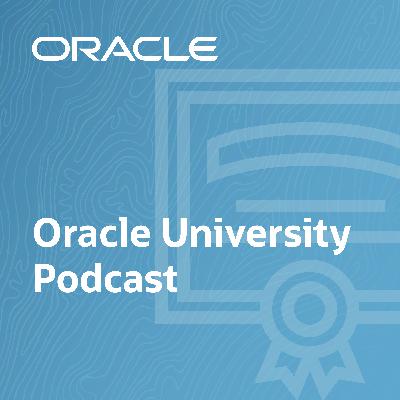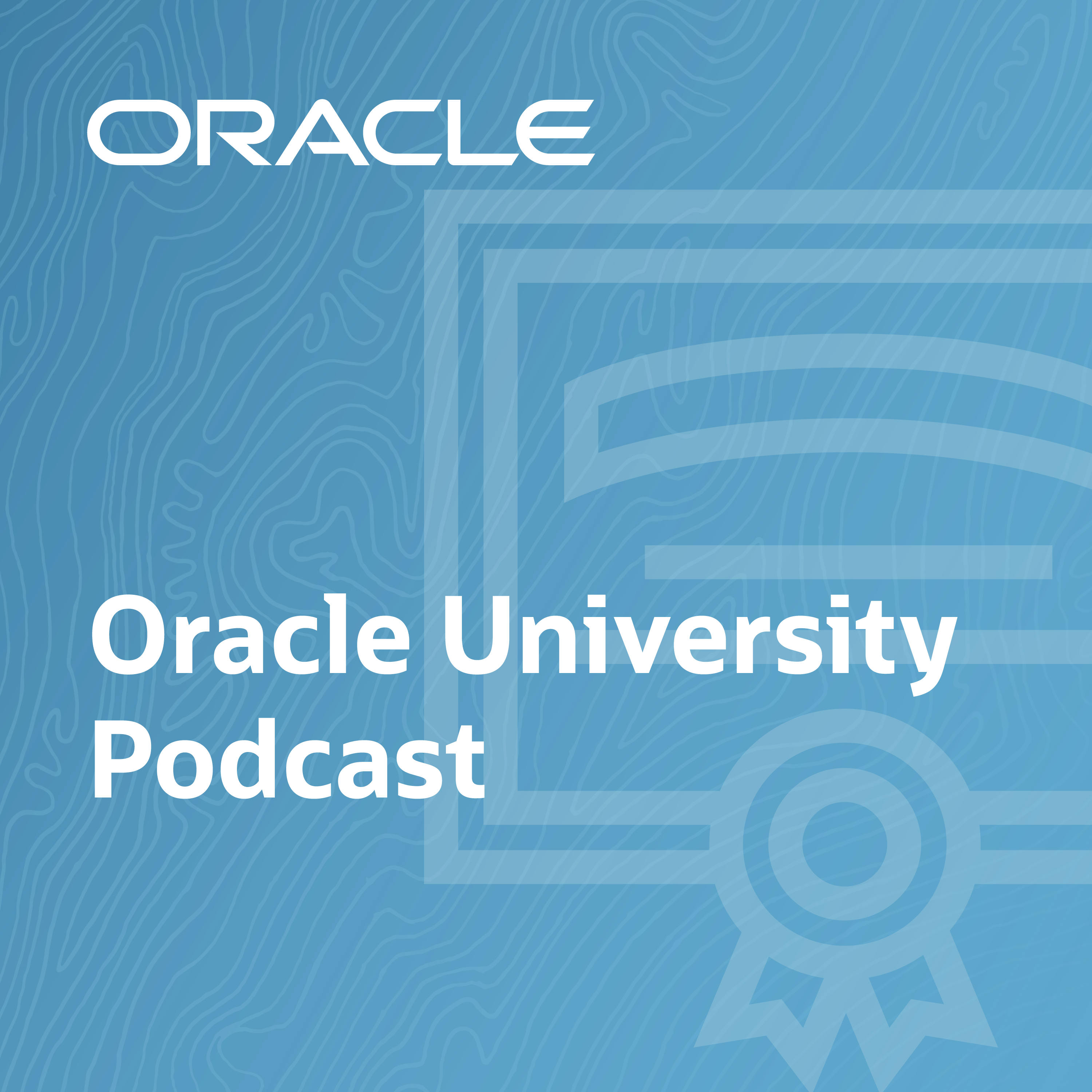Everything You Need to Know to Get Certified on Oracle Autonomous Database
Description
00:00
Welcome to the Oracle University Podcast, the first stop on your cloud journey. During this series of informative podcasts, we’ll bring you foundational training on the most popular Oracle technologies. Let’s get started!
00:26
Lois: Hello and welcome to the Oracle University Podcast. I’m Lois Houston, Director of Innovation Programs with Oracle University, and with me is Nikita Abraham, Principal Technical Editor.
Nikita: Hi everyone! If you’ve listened to us these last few weeks, you’ll know we’ve been discussing Oracle Autonomous Database in detail. We looked at Autonomous Database on serverless and dedicated infrastructure.
Lois: That’s right, Niki. Then, last week, we explored Autonomous Database tools. Today, we thought we’d wrap up our focus on Autonomous Database by talking about the training offered by Oracle University, the associated certification, how to prepare for it, what you should do next, and more.
Nikita: Yeah, we’ll get answers to all the big questions. And we’re going to get them from Susan Jang. Sue is a Senior Principal OCI Instructor with Oracle University. She has created and delivered training in Oracle databases and Oracle Cloud Infrastructure for over 20 years. Hi Sue! Thanks for joining us today.
Sue: Happy to be here!
Lois: Sue, what training does Oracle have on Autonomous Database?
Sue: Oracle University offers a professional-level course called the Oracle Autonomous Database Administration Workshop. So, if you want to learn to deploy and administer autonomous databases, this is the one for you. You’ll explore the fundamentals of the autonomous databases, their features, and benefits. You’ll learn about the technical architecture, the tasks that are involved in creating an autonomous database on a shared and on a dedicated Exadata infrastructure. You’ll discover what is the Machine Learning, you’ll discover what is APEX, which is Application Express, and SQL Developer Web, which is all deployed with the Autonomous Database. So basically everything you need to take your skills to the next level and become a proficient database administrator is in this course.
Nikita: Who can take this course, Sue?
Sue: The course is really for anyone interested in Oracle Autonomous Database, whether you’re a database administrator, a cloud data management professional, or a consultant.
The topics in the course include everything from the features of an Autonomous Database through provisioning, managing, and monitor of the database.
Most people think that just because it is an Autonomous Database, Oracle will do everything for you, and there is nothing a DBA can do or needs to do. But that’s not true.
An Oracle Autonomous Database automates the day-to-day DBA tasks, like tuning the database to ensure it is running at performance level or that the backups are done successfully. By letting the Autonomous Database perform those tasks, it gives the database administrator time to fully understand the new features of an Oracle database and figure out how to implement the features that will benefit the DBA’s company.
Lois: Would a non-database administrator benefit from taking this course?
Sue: Yes, Lois. Oracle courses are designed in modules, so you can focus on the modules that meet your needs. For example, if you’re a senior technical manager, you may not need to manage and monitor the Autonomous Database. But still, it’s important to understand its features and architecture to know how other Oracle products integrate with the database.
Nikita: Right. Talking about the course itself, each module consists of videos that teach different concepts, right?
Sue: Yes, Niki. Each video covers one topic. A group of topics, or I should say a group of related topics, makes up a module.
We know your time is important to you, and your success is important to us. You don’t just want to spend time taking training. You want to know that you’re really understanding the concepts of what you are learning.
So to help you do this, we have skill checks at the end of most modules. You must successfully answer 80% of the questions to pass these knowledge checks. These checks are an excellent way to ensure that you’re on the right track and have the understanding of each module before you move on to the next one.
04:48
Lois: That’s great. And are there any other resources to help reinforce what’s been learned?
Sue: I grew up with this phrase from my Mom. Education was her career. I remember hearing, “I hear and I forget. I see and I remember. I do and I understand.” It’s important to us that you understand the concepts and can actually “do” or “perform” the tasks.
You'll find several demos in the different modules of the Autonomous Database Administration Workshop. These videos are where the instructor shows you how to perform the tasks so you can reinforce what you learned in the lessons. You’ll find demos on provisioning an autonomous database, creating an autonomous database clone, and configuring disaster recovery, and lots more.
Oracle also has what we call LiveLabs. These are a series of hands-on tutorials with step-by-step instructions to guide you through performing the tasks.
Nikita: I love the idea of LiveLabs. You can follow instructions on how to perform administrative tasks and then practice doing that on your own.
Lois: Yeah, that’s fantastic. OK Sue, say I’ve taken the course. What do I do next?
Sue: Well, after you’ve taken the course, you’ll want to demonstrate your expertise with a certification. Because you want to get that better job. You want to increase your earning potential. You need to take the certification called the Oracle Autonomous Database Cloud Professional.
We have a couple of resources to help you along the way to ensure you succeed in securing that certification.
In MyLearn, the Oracle University online learning platform, you’ll see that the course, Oracle Autonomous Database Administration Workshop, falls within a learning path called Become an Oracle Autonomous Database Cloud Professional. The course is the first section of this learning path. The next section is a video describing the certification exam and how to prepare for it. The section after that is a practice exam. Now, though it doesn’t have the actual questions, you’ll find the exam will give you a good idea of the type of questions that will be asked in the exam.
Lois: OK, so now I’ve done all that, and I’m ready to validate my knowledge and expertise. Tell me more about the certification, Sue.
Sue: To get the certification, you must take an online exam. The duration of the exam is 90 minutes. It’s a Multiple Choice format, and there are 60 questions to the exam.
By getting this certification, you’re demonstrating to the world that you have the knowledge to provision, manage, and monitor, as well as migrate workloads to the Autonomous Database, on both a shared as well as a dedicated Exadata infrastructure. You will show you have the understanding of the architect of the Autonomous Database and can successfully use the features as well as its workflow, and you are capable of using Autonomous Database tools in developing an Autonomous Database.
Nikita: Great! So what do I need to do to take the exam?
Sue: We assume you’ve already taken the course (making sure that you’re up to date with the training), that you’ve taken the time to study the topics in depth rather than memorizing superficial information just to pass the exam, looked at the available preparation material, and you’ve also taken the practice exam. I highly recommend that you have the hands-on experience or practice on an Autonomous Database before you take the certification exam.
08:38
Nikita: Hold on, Sue. You said to make sure we’re up to date with the training. How do I do that?
Sue: Technology is ever-changing, and at Oracle, we continually enhance our products to provide features that make them faster or more straightforward to use. So, if you’re taking a course, you may find a small tag that says “New” next to a topic. That indicates that there are some new training that’s been added to the cou









